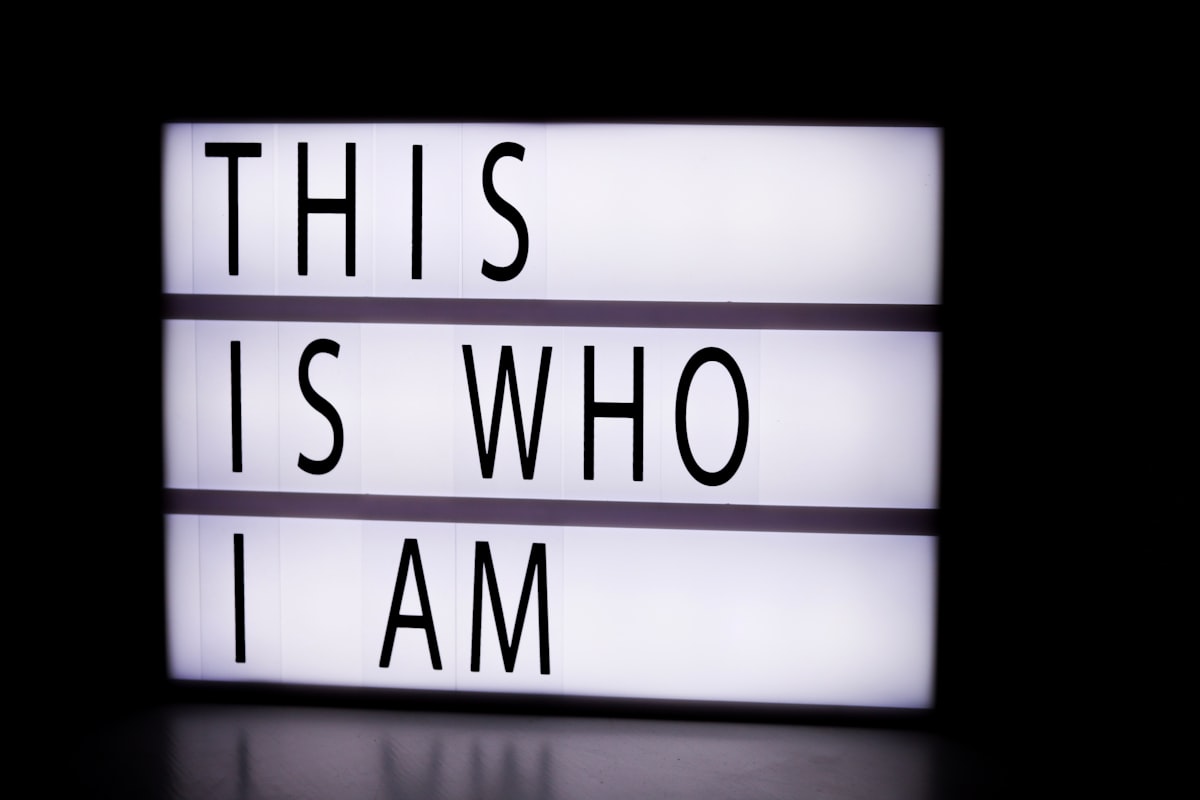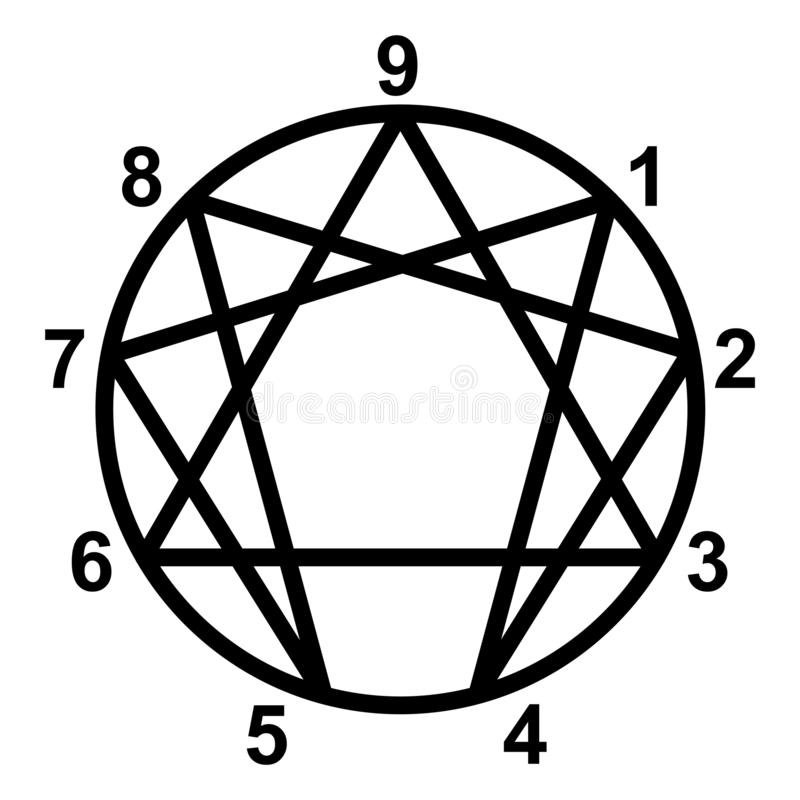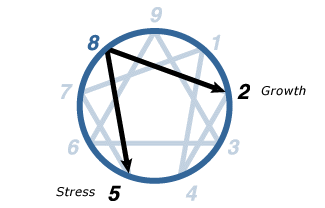What I've Learned From the Enneagram: Lessons from an Enneagram 8

The Enneagram has become quite popular over the last ten years or so. There are numerous people in different corners of the internet creating regular content only around the personality test and how one Enneagram type behaves in a particular situation versus another.
You can find "Enneagram wisdom" from an "Enneagram expert" as easily as you can breathe. You can find an Enneagram coach to help you better understand yourself or others based on personality type.
The Enneagram world has become a runaway train of life advice, some good and some bad.
I don't mean to sound like I dislike it. I think the Enneagram test can be a very insightful tool to help us understand ourselves, and yes, others too.
The Enneagram descriptions can become a pretty comical stereotype to create funny content around, in part because it's such an astute device for highlighting our childhood wounds and how they shape us.
Behavior is dictated by what life's thrown at us and human beings protect themselves in similar ways. So it's relatable and funny to re-create them as caricatures.
The danger comes when we start to think that a personality type tells us everything we need to know about a person when we reduce them to that caricature.
People are complex, deep, dynamic creatures.
It is unfair to reduce them to Enneagram descriptions that we've read once and think we understand them. I've been guilty of it myself, and I'm fascinated by behavior in general so it's tempting to analyze.

What is the Enneagram?
If you don't know what it is, the Enneagram is a personality typing system developed by Oscar Ichazo through years of studying different ancient wisdom traditions.
Using a nine-pointed figure we know as the Enneagram to distinguish each different type from one another, breaking them into three triads (Body, Heart, Mind), and illustrating each type's integration and disintegration lines.
If you want to learn more, you can read all about the history of the Enneagram from the Enneagram Institute.
The Enneagram vs. Other Personality Tests
What I like about the Enneagram over other personality tests such as Meyers-Briggs is that it seemingly always has a deeper level you can go to.
Every personality test tends to amaze you with how accurate it seems, however, they all tend to begin and end with the type description, traits, and circumstantial behaviors (i.e. - type at work, type in a relationship).
The Enneagram is much more dynamic. It describes your base type but also how you respond when you're emotionally healthy (integration line) or when you're unhealthy (disintegration line).
Each Enneagram number can have a dominant wing (the number directly above or below yours) which can color the way you respond individually, differently from others who share your number.
You can also dive into subtypes or instinctual variants. There are three instinctual variants: self-preservation, sexual, and social. So a sexual type one with a dominate type two wing can look very different from a self-preservation type one with a dominate type nine wing. And those types can look even more different depending on the current state of their emotional health which is constantly fluctuating.
The Enneagram is such a layered tool to wholly understand your true self.
Understand Yourself
The real benefit of the Enneagram journey is the insight it can give you into yourself. Unlike with others, we know our own experiences.
When we gain an understanding of the responses typical of our Enneagram type and the common reasons for them, we can begin to draw direct lines from those experiences to our behaviors.
Awareness of our behavioral responses is helpful in lots of ways. If they are harmful perhaps we can change our responses over time to be less harmful to ourselves or others. Sometimes it can even help you avoid those situations in the first place.
For me, the most beneficial use of the Enneagram has been to give me the language to describe many of the feelings and responses which to me have always been instinctual and I now realize aren't a part of the experience of other types.
What the Enneagram Has Taught Me
I'm sure you can guess from the title that I'm an Enneagram type eight, the Challenger. My dominant wing is type seven and I'm fairly certain my subtype is sexual.
I don't know if anyone who knows me would argue my eigthness.
My friend told me recently that one of his friends who met me later told him I am "the eightiest eight" she's ever met.
I definitely fit any general description of Enneagram eight that you can find. I am challenging (to myself and to others), industrious, hate to be controlled, don't like to show weakness, anger is my most accessible emotion, and shy away from vulnerability. But these are fairly general things that any personality test can tell you. Here are some more specific things I've learned on my Enneagram journey.
I learned that I really am instictual
Type 8s are a part of the Gut Triad (8,9,1) and instincts are their primary intelligence center. That is, they tend to use instincts or gut feelings to respond to situations and make decisions.
While this is definitely true for me and always has been, for a long time I didn't quite realize it. When I mentioned the Enneagram giving me the language to talk about my feelings and responses, this is a big part of it.
So many times in my life I've said something like "I just have a feeling" or "this just feels right/wrong." This certainly isn't unique to me, people say this type of thing all the time.
But as I learned more about type 8s I started hearing people talk about the concept of listening to your body and something clicked for me. I have very distinct feelings and sensations in different situations.
I won't go in-depth about it but for example, different feelings or emotions can manifest in my body as sensations of heat or cold, localized or throughout my entire body depending on what it is.
Or, for instance, I had a time of great anxiety when my tongue felt like it was swollen or had lumps in it. My tongue was fine but that feeling was real. Once I realized that my body is trying to communicate to me through these sensations, I started listening more closely.
I learned I need to be physical
Enneagram type 8 is not only a body type but out of the three types from the instinctual center, tends to be the most connected to their bodies.
Us eights have an incredible need for intensity which is often referred to as lust for an eight. The passion of lust for eights just speaks to the passion for intensity in everything we do. Type eights also have seemingly unlimited energy.
I have learned exactly how important it is for the Enneagram type eight to channel that energy in a constructive way. Finding ways to channel my energy into intense exercise has been healing.
When I was younger I was very active. I played organized sports and even coached basketball and soccer and I played basketball several times per week with friends throughout my early adult life.
But when those regular avenues of exercise were suddenly gone, coupled with the sort of lustful indulgence of food that can be typical in an eight, I gained a lot of weight.
When I found ways to channel that energetic ferocity into physical activity that challenged me I lost over 100 pounds.
Yes, you read that correctly.
Type 8s do need to be careful though. They can overindulge in exercise as easily as anything else. There was a time that I was up at 4 a.m. daily, at CrossFit by 4:45, and then afterward I'd go to my company's gym and play basketball with a bunch of friends for an hour and a half. Often at lunch, I'd be back at the gym to take part in a fitness class with coworkers and it wasn't unheard of, after all of that, to go home and do another workout.
These days I still work out daily but I've toned it down. I find that daily exercise is the most important thing for controlling energy which can feed into stress, emotion, and that anger thing we tend to lean into.
I learned how my 8 intensity appears in relationships
Not to keep beating the intensity drum but it's pretty important and you'll see it in all Enneagram descriptions about type 8s. Intensity is also pretty relevant to relationships with an Enneagram eight and if you have type 8s in your life it could be helpful information.
I can only speak to my experience, and for me, intensity is about being one-on-one or in small groups. We tend to have small circles anyway as a way to avoid vulnerability hopefully, but when it comes to individual relationships I very much enjoy the intensity.
I like individual connections because I can dive into it. I'm very present for those moments and I don't have to decide where to direct my attention which dilutes the desire for depth. I do find that I need to be careful when it comes to dating. I'm pretty sure I've had first dates that walked away thinking I was really into them when perhaps I wasn't feeling it. A type eight's engagement doesn't necessarily tell you anything about their feelings. We just do everything fully.

Enneagram 8 Disintegration
Searching for information to solve a problem is a bad sign
Learning is probably my favorite thing. I'm constantly reading, watching videos, diving into new topics, and writing to explore my thoughts. Information isn't a bad thing, but I've learned that there is a difference between intrigue and the desperation of searching for information to make me feel better about a situation.
An eight's disintegration line is to type five. It's important to remember that an eight's connection to the five isn't always a bad thing. After all, a healthy five has a massive capacity for information and they use it to understand how the world works so they can feel more comfortable in it.
When an eight accesses these traits from a place of health it can be quite helpful to drive their natural industriousness.
However, when a type eight finds themself looking desperately for information because it's the only way they can find to "solve" a problem, this is a serious sign that they are stressed, sad, or otherwise upset. Instead of trying to understand a situation from a healthy place, we feel out of control and it manifests as a fraught grasp at a solution.
If this happens, it's a good time to take a step back and reevaluate what's actually going on in their head.
Finding your Enneagram Type
These aren't the only things I've learned from the Enneagram. I'm constantly learning more about my interactions with those close to me, with strangers, and how it plays into work dynamics.
If you don't know anything about the Enneagram and you want to get started, it is my opinion that you are better off not taking the Enneagram test. Spend some time reading all of the type descriptions and you'll likely know which one is you.
You'll know because you'll relate profoundly and it might hurt a little. If you truly can't decide which type you are then go ahead and take the test. For example, maybe you relate to type two and type four and the test will help clarify some things for you.
Some of My Favorite Enneagram Resources
The Sleeping At Last Podcast - Ryan O'Neal is a singer-songwriter who created an entire album of songs about the Enneagram types. Along with it he recorded a podcast to release each song that goes quite in-depth and features Chris Heuertz who wrote The Sacred Enneagram among other books.
Richard Rohr - A Franciscan priest who has written many books and one of my favorites The Universal Christ. He's also a teacher of the Enneagram.
The Road Back to You Podcast - The authors of the book The Road Back to You, Ian Morgan Cron and Suzanne Stabile, do podcast episodes where they interview people who identify as the different Enneagram types. Getting the personal perspective of different types is insightful.